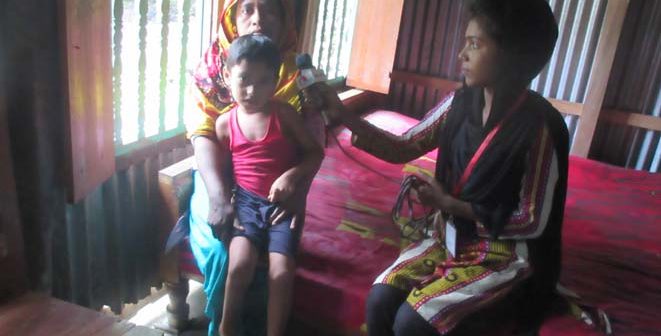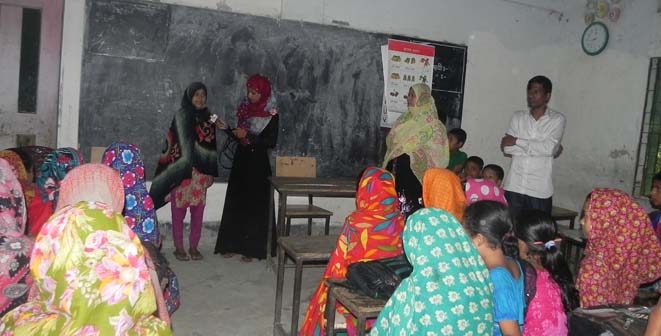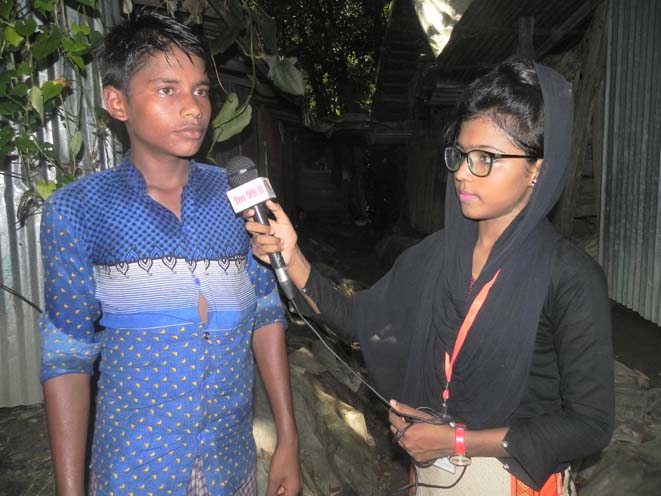It was raining in the morning at 10:30am and Radio Meghna crackled to broadcast local news and development messages for women empowerment and child development. Every morning and evening, the radio broadcasts issues on local community. One day on August 12, Champakali, the news producer of the community radio discovered the Badarhat Community Health Clinic (CHC) closed for five days consecutively.

The radio has drawn the attention of the community people. The listeners are getting the development messages through the community radio. Cham-pakali, decided to broadcast the news of the closure of the community clinic. She told the audience that the state-managed clinic had deprived hundreds of pregnant women, mothers and children from health services for days, which was not expected from a government healthcare providing outlet.
The following day the radio station manager Rashida Begum received a phone call from a Community Health Care Provider (CHCP) informing that the state managed clinic has reopened and ready to deliver health services to women and children. Rashida and Champakali felt it was a major achievement in making community broadcast meaningful and earned the confidence of the community. Radio Meghna 99.0 FM, broadcast 365 days round the year, from COAST
Trust office in Char Fasson since 18 February 2015. The inhabitants at 17 km radius area of the radio station can listen the broadcast. This area covers the communities in 18 unions of Charfasson upazila out of 19. An estimated 400,000 people listens to Radio Meghna.
The development messages are disseminated through Radio Meghna to the community, mostly in local language for increasing their knowledge and skills, said Rashida Begum. Nishi Begum was a college student when joined Radio Meghna and is the oldest staff in the team of Rashida Begum.
Among the five selected for the radio broadcast team, only Nishi is still working. The other four other women colleagues, left the team after they were married off to distant villages. “It is pity that most of the radio team members drops out for two major reasons,” lamented Nishi.
Firstly, when the women colleagues are married off, secondly, when some of them decides to pursue higher education in district towns or in big cities, Nishi said. Feedback of the radio listeners is coordinated by Maria Jannat Laboni. She said the radio has several listeners’ clubs in some villages. The club members include fishermen, farmers and women.

The radio broadcasts issues of Sustainable Development Goals (SDG), Child Rights Convention (CRC), Convention on the Elimination of all Forms of Discrimination Against Women (CEDAW), child labor, child marriage, mother and child healthcare, adolescent development, agriculture and farming, fish farming and other community issues.
The government of Bangladesh gave licenses to community radio in 2000 in compliance with the Article 19 of Charter of the Universal Declaration of Human Rights. The community radio plays a role of communication and media in exercising democratic political participation in society, says AHM Bazlur Rahman, Chief Executive Officer at Bangladesh NGOs Network for Radio and Communication (BNNRC).
Community radio can be an effective platform to raise voices of the poor, to enhance people’s capacity of claiming the legitimate rights and eradicate discriminations, says Rahman.
Community radios have demonstrated that the new media can play a significant role at grassroots level for rural development, poverty, agriculture, gender inequality, education, social problems among others could be the focus for programming.


